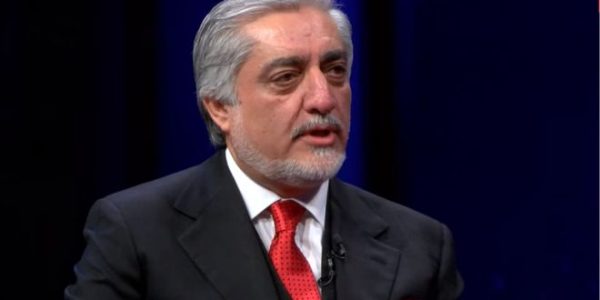Abdullah Abdullah, the chairperson of Afghanistan’s High Council for National Reconciliation (HCNR), said that early withdrawal of US troops will have consequences. His remarks came hours after US President Donald Trump, on September 07, wrote in tweet, “We should have the small remaining number of our BRAVE Men and Women serving in Afghanistan home by Christmas!”
Mr. Abdullah, who was speaking at the think tank Institute for Defense Studies and Analyses (IDSA) in New Delhi said, “The US withdrawal will happen one day and Afghanistan should be able to stand on its own feet, but it is premature and will have its consequences.”
The chairperson of High Council for National Reconciliation (HCNR) last week paid an official visit to New Delhi in pursuit of building a regional consensus on Afghan peace talks which are underway in Doha, Qatar. On his five day visit to India, Abdullah met with top Indian leaders including Prime Minister Narendra Modi, India’s National Security Adviser Ajit Doval, and the Indian foreign minister, S Jaishankar. The two sides, as Mr. Abdullah wrote on Twitter, had friendly conversations on a range of issues including peace negotiations.
Negotiations between the Afghan government and the Taliban started last month in Doha but progress has been very slow as the two sides have got bogged down in setting procedure and conflict resolution mechanism for substantive negotiations.
On February 29, the US signed a peace deal with the Taliban aimed at ending America’s war in Afghanistan. Under the US-Taliban deal, the Afghan government set free over 5,000 Taliban prisoners, including some notorious Taliban commanders who were involved in high-profile crimes, in return for exchange of 1,000 plus Afghan security forces held by the Taliban. The deal bounds the Taliban to give counterterrorism guarantees—meaning not allowing any military group to attack the US and its allies from Afghanistan—cut ties with al-Qaeda, Islamic State and other terrorist organizations, lay down gun, and seek a political settlement with the Afghan government. In return, the US will pull out all its troops by May 2021.
But a UN report, published in June, says the Taliban maintain ties with al-Qaeda.
Withdrawal of troops is conditional
In response to Trump’s remarks about withdrawal of US troops from Afghanistan, Jens Stoltenberg, the Secretary-General of NATO, said NATO and all allies will “make decision based on conditions on the ground, because NATO thinks it is extremely important to continue to be committed to the future of Afghanistan.”
Trump’s comments alerted defense officials at the Pentagon as some US defense authorities said a hasty withdrawal could undercut negotiations to finalize a peace deal between the Taliban and the Afghan government, according to Associated Press.
The Taliban have not met a key commitment they had made to US officials before signing peace deal. As per the agreement, the Taliban have to reduce violence against the Afghan forces but contrary to this key element of deal, the insurgents have intensified violence against Afghan security forces and national institutions.
Over last week, dozens of Afghan security forces and civilians, were killed in suicide attacks in eastern provinces of Afghanistan. In a latest act of violence, the group has exploded a school building in southern Kandahar province.
Zabihullah Mujahed, a spokesperson for Taliban, welcomed Trump’s abrupt tweet as a positive step for the implementation of the US-Taliban agreement.
But many in Afghanistan say that a hasty withdrawal of US troops from the country is unwise.
“If other conditions attached to their withdrawal are not met, for example, if the terrorist groups like al-Qaeda continue to pose a threat against the people of Afghanistan, or ISIS and others, there will be consequences as a result of that,” said the chairperson of Afghanistan’s HCNR.
Efforts underway to break stalemate in Doha
Zalmay Khalilzad, the US envoy for Afghanistan reconciliation, on Thursday, October 08, met with Pakistan’s chief of army staff, Gen, Qamar Bajwa in Islamabad. Khalilzad, accompanied by Gen. Austin Miller, commander of U.S. forces in Afghanistan, discussed Afghan peace process. He said that mistakes made in past should not be repeated in the future.
Pakistan’s role in establishing a lasting peace in Afghanistan is vital.
Khalilzad, who is seen as the architect of US-Taliban agreement, until now has been not able to get the Taliban to sign on to a reduction in violence while negotiations in Doha is facing a stalemate. In their trip to Islamabad, Khalilzad and Gen. Miller were likely seeking Pakistan’s help to push the insurgents to agree to ceasefire, according to some reports.
Following the February deal, the Taliban insurgents, keeping to their promise, have not attacked on US and NATO forces in Afghanistan, but a surge of deadly attacks on Afghan security forces and government facilities has intensified in parts of the country.




